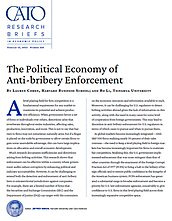Much research documents inefficiencies and distortions arising from bribing activities. This research shows that enforcement can be effective within a country where government audits reduce corruption by enhancing political and judiciary accountability. However, it can be challenging to extend both the detection and enforcement of anti-bribery laws to extraterritorial jurisdictions against companies. For example, there are a limited number of firms that the Securities and Exchange Commission (SEC) and the Department of Justice (DOJ) can target with the constraints on the economic resources and information available to each. Moreover, it can be challenging for U.S. regulators to detect bribing activities abroad given the lack of information on this activity, along with the need in many cases for some level of cooperation from foreign governments. This may lead to discretion in anti-bribery enforcement for U.S. regulators in terms of which cases to pursue and when to pursue them.
As global markets become increasingly integrated—with S&P 500 firms realizing nearly 50 percent of their sales overseas—the need to keep a level playing field in foreign markets has become increasingly important for firms to maintain fair competition. Realizing this, the U.S. government implemented enforcement that was more stringent than that of other countries through the enactment of the Foreign Corrupt Practices Act of 1977 (FCPA) to bring a halt to the bribery of foreign officials and to restore public confidence in the integrity of the American business system. FCPA enforcement has generated a substantial surge in broader enforcement and become a priority for U.S. law enforcement agencies, conceivably to give confidence to U.S. firms in this level playing field across their increasingly expansive competitive space.
Our research provides evidence that this tool that was meant to level the playing field has been used—at least in part—for precisely the opposite purpose. FCPA enforcement actions are correlated in geography, time, and usage with political motives, tipping the scales against certain firms. In particular, there are spikes in enforcement actions for firms operating in states just prior to important elections in those states; these spikes in FCPA enforcement are concentrated in foreign-headquartered (as opposed to domestic-headquartered) firms; and the spikes in enforcement occur specifically at those firms that compete most intensely with domestic firms in dominant industries in the important election state.
We study the relationship between electoral politics and FCPA regulatory actions. FCPA enforcement policy is conducted in state courts and brought by either the SEC or the DOJ. Our analysis examines the enforcement actions initiated against publicly traded companies for foreign bribery by the DOJ and the SEC. There has been a large rise in these enforcement actions in recent times. We explore one potential determinant of this rise: the political determinants of antibribery enforcement.
We do this by examining U.S. Senate elections, which have schedules that are predetermined and known years in advance. They are staggered spatially and in time, with one-third of Senate seats being up for reelection of six-year terms every even-numbered year (outside of special election circumstances). Moreover, unlike presidential elections, there is substantial variation across states in the timing of Senate elections. We exploit this variation in Senate election timing and locations to explore the extent to which anti-bribery enforcement is related to electoral concerns.
Our sample consists of 8,677 publicly listed companies with subsidiaries in both the United States and foreign countries from 1985 to 2017. To study whether political incentives influence the enforcement action of regulators, we use detailed subsidiary-level data of U.S. and foreign companies and link the location of subsidiaries to the state electoral cycles. There is strong evidence that election cycles affect regulators' enforcement actions. Our results suggest that regulators do not respond equally to all firms, instead focusing primarily on foreign firms. We find that the probability of a regulatory enforcement action increases by 20 percent for foreign companies in the year leading up to an election. However, we do not observe that regulators target U.S. firms at all during the preelection year. Together, these results suggest discretion taken in enforcement preelection.
Moreover, we explore the potential underlying mechanism behind these findings, finding evidence consistent with political and economic incentives. We show that enforcement actions are significantly related to the level of foreign competition and the exposure of firms to global supply-chain networks in the year leading up to elections. Foreign companies have a higher probability of being targeted if they compete with U.S. companies or have stronger economic links with foreign supply-chain networks (as opposed to domestic networks). Moreover, we also find evidence that constituent interests are related to the aggressiveness of regulators' enforcement actions. Regulators significantly reduce enforcement in industries and firms with many establishments in their state. Instead, they focus enforcement actions on industries that do not have a large economic footprint in their jurisdiction. These actions are therefore less likely to negatively affect or upset voting constituents.
Turning to the impact of these enforcements, we find that enforcement actions are followed by jumps in media attention concerning FCPA enforcement in the state, coupled with larger vote shares for the senator that brings action against foreign firms. Both patterns are consistent with being driven by political motivations.
In sum, our research shows that political incentives appear as a potential consideration when evaluating the impact of regulatory actions in a multinational context. By investigating the incentives of politicians, we provide evidence on how political motives might subtly shape regulatory decisions and what mechanisms might lead to discretionary enforcement. Further, our work provides new evidence supporting the view that political influence over anti-bribery enforcement may have unintended consequences on broader measures of competitiveness and international trade.
NOTE
This research brief is based on Lauren H. Cohen and Bo Li, “The Political Economy of Anti-Bribery Enforcement,” Social Science Research Network, December 2021.

